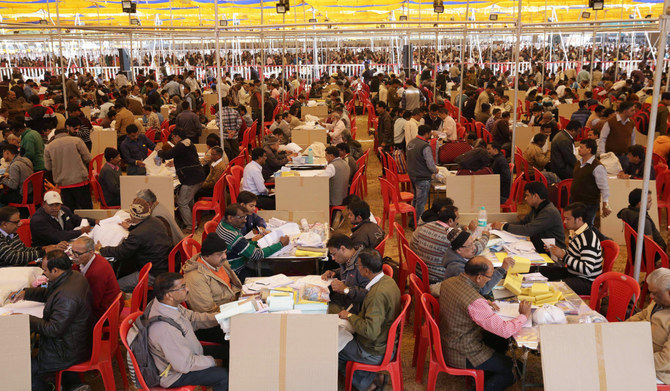
33 percent of respondents said that they believe Hamas is more appropriate than Fatah, led by President Mahmoud Abbas
RAMALLAH: A Palestinian public opinion poll in the West Bank and Gaza Strip, conducted by the Palestinian Center for Policy and Survey Research in Ramallah between June 22-25, has indicated a significant decline in the popularity of the Fatah movement and its leadership.
Similarly significant decreases in support for the two-state solution and the one-state democratic solution were also recorded, and an increase in support for a return to an armed intifada and support for the recent armed attacks inside Israel.
The majority of respondents, meanwhile, still see the Palestinian-Israeli conflict as a national struggle over land and sovereignty, rather than a religious conflict.
The poll results indicate a shift in the internal balance of power in favor of Hamas and its leadership; 33 percent of respondents said that they believe Hamas is more appropriate than Fatah, led by President Mahmoud Abbas, to represent and lead the Palestinian people. In comparison, 23 percent said they think that Fatah is more appropriate.
Thirty-three percent say that if new presidential elections were held today and only two candidates, Abbas and Ismail Haniyeh, stood, they would elect Abbas, while 55 percent said they would elect Haniyeh.
If the competition was between Marwan Barghouti and Haniyeh, though, Barghouti would receive 61 percent and Haniyeh 34 percent, and if President Abbas did not run for elections, Barghouti was the preferred candidate, as 30 percent chose him, followed by Haniyeh with 16 percent, then Mohammed Dahlan with 6 percent, then Yahya Al-Sinwar with 4 percent, then Hussein Al-Sheikh with 3 percent.
Twenty-three percent said they are satisfied with President Abbas’ performance, while 73 percent are dissatisfied, and 77 percent say they want the president to resign. Just 18 percent say they want him to stay in office.
In all, 79 percent of the public said that the Palestinian government does not play an influential role in addressing high prices and their effects. In comparison, 57 percent objected to President Abbas’s internal decisions, such as transferring powers to the General Secretariat of the Legislative Council for the Presidency of the National Council.
In addition, 71 percent said that they want to hold general Palestinian legislative and presidential elections soon in the Palestinian Territories. A majority of 54 percent, though, say they do not believe that elections will take place soon.
Just over a quarter of the Palestinian public say they want to emigrate due to the current political, security and economic conditions, and 86 percent believe there is corruption in the institutions of the Palestinian Authority. In comparison, 71 percent say that there is corruption in the institutions run by Hamas in the Gaza Strip, and 59 percent believe that the PA has become a burden on the Palestinian people.
Forty-two percent of the population of the West Bank say that people can criticize the PA without fear. In comparison, 54 percent say that this is not possible. In contrast, in the Gaza Strip, 62 percent say criticism of Hamas is not possible.
Meanwhile, 73 percent believe that the government of Prime Minister Mohammed Shtayyeh will not succeed in achieving reconciliation and uniting the West Bank and the Gaza Strip. In comparison, 21 percent think that it will succeed. Twenty-three percent believe the government will succeed in holding legislative and presidential elections in the West Bank and the Gaza Strip. In comparison, 69 percent say it will not succeed, and 75 percent expect that the government will not succeed in improving economic conditions.
Fifty-nine percent believe that individual shootings inside Israel by Palestinians not affiliated with political movements contribute to ending the occupation, and 50 percent believe armed struggle is the best way to establish an independent state. In comparison, 22 percent said it would be done through negotiations, and 21 percent said it would happen through peaceful popular resistance.
Seventy percent believe the two-state solution is no longer feasible due to settlement expansion, but 27 percent believe it is still achievable. Likewise, 77 percent say that the chances of establishing an independent Palestinian state alongside Israel during the next five years are slim or very small, and 19 percent say that the chances are medium or high.
Sixty-nine percent say that under the current circumstances, they do not support the return of the Palestinian side to negotiations with Israel without preconditions. In comparison, 22 percent say they support this, 65 percent oppose returning to dialogue with the US, and 29 percent are in favor.
Seventy-five percent say that the PA should remain neutral in the war between Russia and Ukraine, with 14 percent backing Russia and 6 percent Ukraine.
Thirty-two percent said that the biggest problem facing the Palestinians is the occupation, while 23 percent said it was corruption. A further 17 percent said it was unemployment.
Ibrahim Melhem, the spokesperson for the PA, told Arab News: “Citizens’ satisfaction with the performance of the Palestinian government in particular stems from circumstances; sometimes there are good conditions that allow the government to provide the best services, and therefore it is fortunate to obtain citizens’ satisfaction, but sometimes the government faces a multi crisis, so the percentage of people satisfied by its performance declines.
“We make every effort to obtain reasonable satisfaction and provide the best services to citizens within what the government"s available capabilities allow,” he added.
Amer Hamdan, a human rights activist, told Arab News: “I think the percentage in the poll results is logical and reasonable, because frankly, there is resentment against the performance of the PA, and people want to hold elections so that the factions can participate in the political process, but the PA continues to arrest political activists and continues to normalize with Israel.
“People in the PA in the West Bank enjoy economic, political and security privileges for themselves and their children. Therefore, it is not in their interest to organize elections,” Hamdan added.












